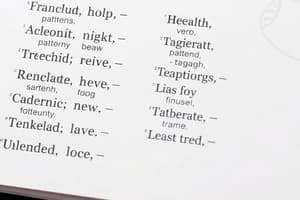Podcast
Questions and Answers
Which verb can correctly follow 'avoid' in the sentence: 'I avoid ___ sweets.'?
Which verb can correctly follow 'avoid' in the sentence: 'I avoid ___ sweets.'?
- to eat
- to be eaten
- eating (correct)
- eat
Which option correctly completes the sentence: 'She decided ___ last minute.'?
Which option correctly completes the sentence: 'She decided ___ last minute.'?
- to change (correct)
- change
- changing
- to be changed
What is the correct form after the verb 'suggest' in the sentence: 'He suggested ___ a new strategy.'?
What is the correct form after the verb 'suggest' in the sentence: 'He suggested ___ a new strategy.'?
- develops
- to develop
- developing (correct)
- developed
Which verb combination is correct in the sentence: 'I would like ___ my homework on time.'?
Which verb combination is correct in the sentence: 'I would like ___ my homework on time.'?
Identify the correct verb form to complete: 'My teacher let me ___ the book early.'
Identify the correct verb form to complete: 'My teacher let me ___ the book early.'
Flashcards are hidden until you start studying
Study Notes
Verb Patterns
Verb + ...ing
- Common verbs that require the gerund form include avoid, can't stand, consider, enjoy, hate, like, love, miss, not mind, practice, prefer, start, stop, and suggest.
- Examples illustrate usage: "I avoid eating sweets," and "She loves cooking."
Verb + to + ...
- Certain verbs require the infinitive form, such as afford, agree, choose, decide, help, hope, learn, manage, need, offer, plan, promise, seem, want, wish, would like, would love, and would prefer.
- Usage examples include: "I want to be famous," and "I would love to go with you."
Verb + ...
- Some verbs directly create a causative structure: make and let.
- Example usage: "My mom made me clean my room."
Verb + to + ...
- Verbs that allow an object to follow include advise, allow, beg, help, invite, order, tell, want, would like, would love, and would prefer.
- Examples include: "My dad allowed me to go to the party," and "I would like Anna to be happy."
Modal Verbs
- Modal verbs such as can, could, might, must, and should are used to express ability, possibility, necessity, or obligation.
- Example sentences demonstrate their function: "You can go there," and "I should clean my room."
Studying That Suits You
Use AI to generate personalized quizzes and flashcards to suit your learning preferences.




